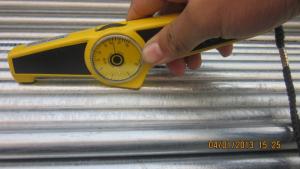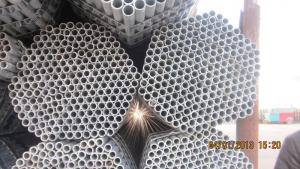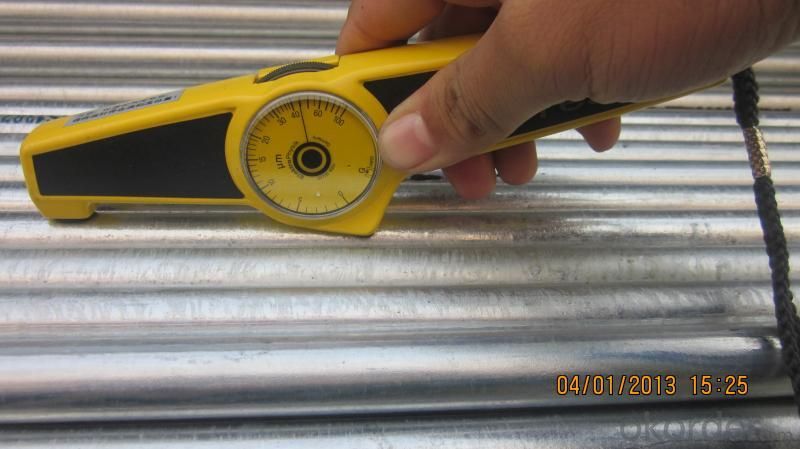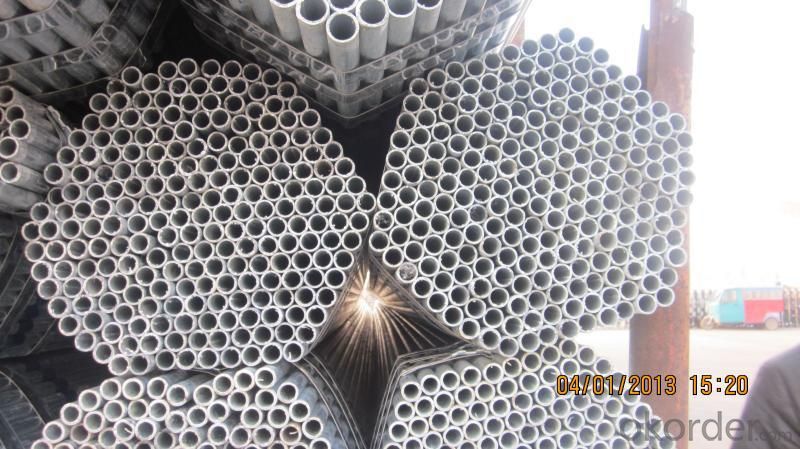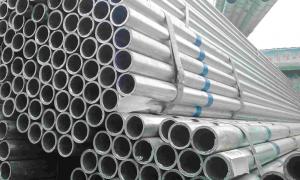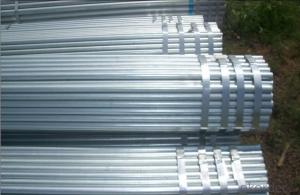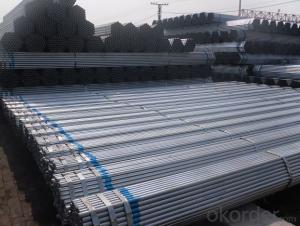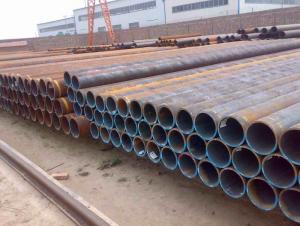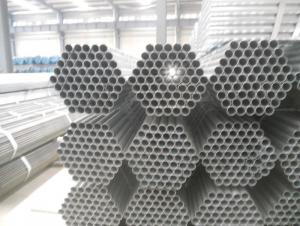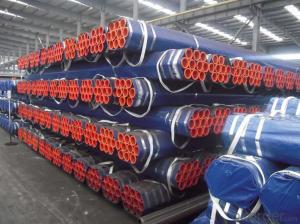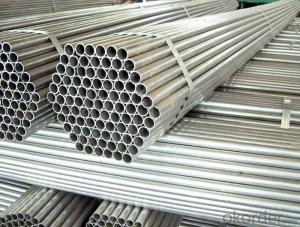Hot Dipped Galvanized Steel Pipe Welded ERW ASTM A53 BS 1387 GB3091
- Loading Port:
- Tianjin Port
- Payment Terms:
- TT or LC
- Min Order Qty:
- Negotiable m.t.
- Supply Capability:
- 5000 Tons Per Month m.t./month
OKorder Service Pledge
OKorder Financial Service
You Might Also Like
1.Specification of Hot Dipped Galvanized Steel Pipe Welded ERW
1)Application:It is widely used in building, machine, chemical equipment, automobile industrial, container, it is also applied to agriculture and mine machine.
2)Standard:ASTM A53,BS1387,GB3091
3)Steel grade: ASTM A53: A, B, C GB3091, BS1387:Q195,Q215,Q235
4)Thickness of zinc coating: 100g/m2, 120g/m2, 150g/m2, 200g/m2, 250g/m2, 300g/m2, 350g/m2. 400g/m2
2.Size of Pipe
OD(MM) WT(MM) | 21.3 | 26.7 | 33.4 | 42.2 | 48.3 | 60.3 | 73 | 88.9 | 114.3 | 141.3 | 168.3 | 219.1 |
1.70 |
|
|
|
|
|
|
|
|
|
|
|
|
1.80 |
|
|
|
|
|
|
|
|
|
|
|
|
1.90 |
|
|
|
|
|
|
|
|
|
|
|
|
2.00 |
|
|
|
|
|
|
|
|
|
|
|
|
2.10 |
|
|
|
|
|
|
|
|
|
|
|
|
2.20 |
|
|
|
|
|
|
|
|
|
|
|
|
2.30 |
|
|
|
|
|
|
|
|
|
|
|
|
2.40 |
|
|
|
|
|
|
|
|
|
|
|
|
2.50 |
|
|
|
|
|
|
|
|
|
|
|
|
2.75 |
|
|
|
|
|
|
|
|
|
|
|
|
3.00 |
|
|
|
|
|
|
|
|
|
|
|
|
3.25 |
|
|
|
|
|
|
|
|
|
|
|
|
3.50 |
|
|
|
|
|
|
|
|
|
|
|
|
3.75 |
|
|
|
|
|
|
|
|
|
|
|
|
4.00 |
|
|
|
|
|
|
|
|
|
|
|
|
4.25 |
|
|
|
|
|
|
|
|
|
|
|
|
4.50 |
|
|
|
|
|
|
|
|
|
|
|
|
4.75 |
|
|
|
|
|
|
|
|
|
|
|
|
5.00 |
|
|
|
|
|
|
|
|
|
|
|
|
5.25 |
|
|
|
|
|
|
|
|
|
|
|
|
3. Packing & Delivery
Packing Detail: In bundles or acordng to costumer's requirement
Delivery Term: 30 days after receving payment or L/C
4.Data Sheet
ASTM A53
ASTM A53 LIGHT ( HOT DIPPED GALVANIZED PIPES) | ||||||||
SIZE | Max | Min | Wall Thickness | Bare Pipes Weight | Screwed & Socketed Pipes Weight | |||
INCH | NB(MM) | mm | mm | mm | kg/m | kg/m | ||
1/2" | 15 | 21.4 | 21 | 2 | 0.947 | 0.956 | ||
3/4" | 20 | 26.9 | 26.4 | 2.3 | 1.38 | 1.39 | ||
1" | 25 | 33.8 | 33.2 | 2.6 | 1.98 | 2 | ||
1-1/4" | 32 | 42.5 | 41.9 | 2.6 | 2.54 | 2.57 | ||
1-1/2" | 40 | 48.4 | 47.8 | 2.9 | 3.23 | 3.27 | ||
2" | 50 | 60.2 | 59.6 | 2.9 | 4.08 | 4.15 | ||
2-1/2" | 65 | 76 | 75.2 | 3.2 | 5.71 | 5.83 | ||
3" | 80 | 88.7 | 87.9 | 3.2 | 6.72 | 6.39 | ||
3-1/2" | 90 | 113.9 | 113 | 3.6 | 9.75 | 10 | ||
ASTM A53 MEDIUME ( HOT DIPPED GALVANIZED PIPES) | ||||||||
SIZE | Max | Min | Wall Thickness | Bare Pipes Weight | Screwed & Socketed Pipes Weight | |||
INCH | NB(MM) | mm | mm | mm | kg/m | kg/m | ||
1/2" | 15 | 21.7 | 21.1 | 2.6 | 1.21 | 1.22 | ||
3/4" | 20 | 27.2 | 26.6 | 2.6 | 1.54 | 1.57 | ||
1" | 25 | 34.2 | 33.4 | 3.2 | 2.41 | 2.43 | ||
1-1/4" | 32 | 42.9 | 42.1 | 3.2 | 3.1 | 3.13 | ||
1-1/2" | 40 | 48.9 | 48.3 | 3.2 | 3.57 | 3.61 | ||
2" | 50 | 60.8 | 59.9 | 3.6 | 5.03 | 5.1 | ||
2-1/2" | 65 | 76.6 | 75.4 | 3.6 | 5.43 | 6.55 | ||
3" | 80 | 89.5 | 88.1 | 4.5 | 8.37 | 8.54 | ||
4" | 100 | 114.9 | 113.3 | 4.5 | 12.2 | 12.5 | ||
5" | 125 | 140.6 | 138.7 | 5 | 15.6 | 17.1 | ||
6" | 150 | 166.1 | 164.1 | 5 | 19.7 | 20.3 | ||
ASTM A53 HEAVY ( HOT DIPPED GALVANIZED PIPES) | ||||||||
SIZE | Max | Min | Wall Thickness | Bare Pipes Weight | Screwed & Socketed Pipes Weight | |||
INCH | NB(MM) | mm | mm | mm | kg/m | kg/m | ||
1/2" | 15 | 21.7 | 21.1 | 3.2 | 1.44 | 1.45 | ||
3/4" | 20 | 27.2 | 26.6 | 3.2 | 1.87 | 1.88 | ||
1" | 25 | 34.2 | 33.4 | 4 | 2.94 | 2.96 | ||
1-1/4" | 32 | 42.9 | 42.1 | 4 | 3.8 | 3.83 | ||
1-1/2" | 40 | 48.9 | 48.3 | 4 | 4.38 | 4.42 | ||
2" | 50 | 60.8 | 59.9 | 4.5 | 5.19 | 5.26 | ||
2-1/2" | 65 | 76.6 | 75.4 | 4.5 | 7.93 | 8.05 | ||
3" | 80 | 89.5 | 88.1 | 5 | 10.3 | 10.5 | ||
4" | 100 | 114.9 | 113.3 | 5.4 | 14.5 | 14.9 | ||
5" | 125 | 140.6 | 138.7 | 5.4 | 17.9 | 18.4 | ||
6" | 150 | 166.1 | 164.1 | 5.4 | 21.3 | 22.9 | ||
5. Products Showroom
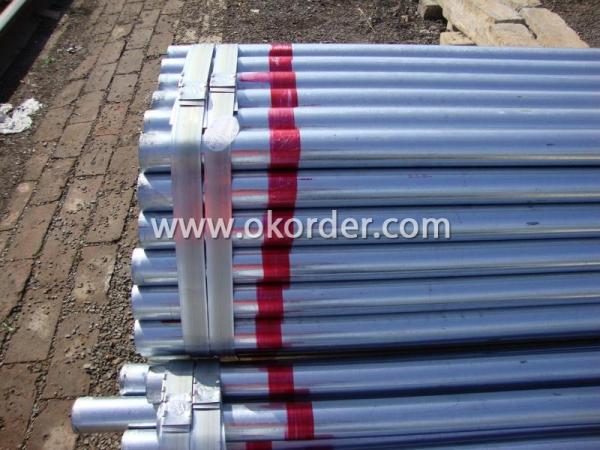
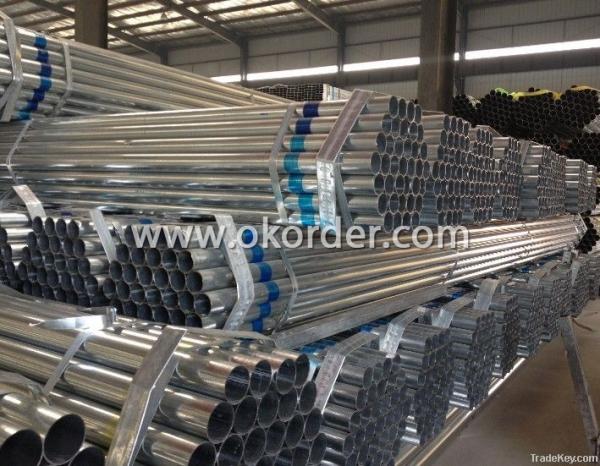
- Q: What are the different methods of repairing damaged steel pipes?
- There are several methods for repairing damaged steel pipes, including welding, epoxy coatings, pipe wrapping, and pipe lining. Welding involves fusing the damaged sections of the pipe using heat and specialized equipment. Epoxy coatings are applied to the damaged area to create a protective layer and restore the pipe's integrity. Pipe wrapping involves applying specialized tapes or wraps around the damaged area to provide structural support. Pipe lining involves inserting a new pipe into the damaged one, creating a seamless and durable solution. The appropriate method depends on the extent and location of the damage, as well as other factors such as cost and time constraints.
- Q: What is the cost of steel pipes compared to other pipe materials?
- The cost of steel pipes can differ from other pipe materials depending on various factors, such as size, grade, and availability. However, steel pipes typically offer more cost-effectiveness compared to alternative materials. This is due to the widespread availability and versatility of steel, which allows for easy manufacturing and fabrication into different pipe sizes and shapes. When compared to materials like copper, stainless steel, or plastic, steel pipes are often more affordable due to their lower manufacturing costs. Furthermore, steel pipes have a longer lifespan and superior durability, making them a cost-effective choice in the long term. They exhibit resistance to corrosion, can withstand high pressure and temperature, and find applications in plumbing, construction, and infrastructure projects. It is worth mentioning that the cost of steel pipes can still fluctuate based on market conditions, demand, and location. Nevertheless, overall, steel pipes are generally considered a cost-effective option when compared to other pipe materials.
- Q: What are the common fittings and accessories used with steel pipes?
- Some common fittings and accessories used with steel pipes include couplings, elbows, tees, reducers, flanges, and valves. Additionally, accessories such as pipe hangers, brackets, clamps, and gaskets are often used to support and secure the pipes.
- Q: What are the different types of steel pipe reducers?
- There are several types of steel pipe reducers, including concentric reducers, eccentric reducers, and reducing tees.
- Q: What is the difference between steel pipes and HDPE pipes?
- Steel pipes and HDPE pipes are both commonly used for various applications, but they differ in their composition and characteristics. Steel pipes are made from a combination of iron and carbon, offering high strength, durability, and resistance to extreme temperatures and pressure. They are commonly used in industries like oil and gas, construction, and plumbing. On the other hand, HDPE pipes are made from high-density polyethylene, a thermoplastic material known for its flexibility, corrosion resistance, and lightweight nature. HDPE pipes are often used in water supply and drainage systems, as well as for underground and aboveground applications. Ultimately, the choice between steel pipes and HDPE pipes depends on the specific requirements of the project, including factors such as cost, application, and environmental conditions.
- Q: The difference between carbon and welded steel tubes
- Seamless steel pipe because there is no weld, so can withstand greater pressure, boiler tubes are generally used seamless steel pipe
- Q: What are the different types of coatings used for external protection of steel pipes?
- There are several types of coatings commonly used for the external protection of steel pipes, including fusion bonded epoxy (FBE) coatings, three-layer polyethylene (3LPE) coatings, three-layer polypropylene (3LPP) coatings, and coal tar enamel (CTE) coatings. Each of these coatings provide different levels of corrosion resistance and durability, depending on the specific requirements of the project or application.
- Q: Is the diameter of the steel tube indicated by the outer diameter by the wall thickness or by the inside diameter by the wall thickness?
- The specification for steel tubes is the outer diameter multiplied by the wall thickness.Generally speaking, the diameter of the pipe can be divided into outer diameter (De), inner diameter (D) and nominal diameter (DN).
- Q: What is the difference between steel pipes and fiberglass-reinforced pipes?
- The main difference between steel pipes and fiberglass-reinforced pipes lies in their composition and structural characteristics. Steel pipes are made of a durable metal alloy, typically carbon steel, which provides strength and resistance to high pressure and temperature. On the other hand, fiberglass-reinforced pipes are composed of a plastic matrix reinforced with glass fibers, making them lightweight, corrosion-resistant, and suitable for various applications. While steel pipes are commonly used in industrial settings, fiberglass-reinforced pipes are often utilized in sectors requiring corrosion resistance, such as chemical processing, wastewater treatment, and oil and gas industries.
- Q: How do steel pipes perform in high-temperature applications?
- Steel pipes perform well in high-temperature applications due to their excellent heat resistance and structural integrity. The high melting point of steel allows it to withstand extreme temperatures without deformation or failure. Additionally, steel pipes have good thermal conductivity, which ensures efficient heat transfer in industrial processes.
1. Manufacturer Overview
| Location | Tianjin, China |
| Year Established | 1999 |
| Annual Output Value | Above Thirty Million RMB |
| Main Markets | Main land; Middle East; Southeast Asia |
| Company Certifications | ISO 9001:2011;CE:2010 |
2. Manufacturer Certificates
| a) Certification Name | |
| Range | |
| Reference | |
| Validity Period |
3. Manufacturer Capability
| a) Trade Capacity | |
| Nearest Port | Tianjin |
| Export Percentage | 30% - 40% |
| No.of Employees in Trade Department | 101-200 People |
| Language Spoken: | English; Chinese |
| b) Factory Information | |
| Factory Size: | 50,000 square meters |
| No. of Production Lines | Above 14 |
| Contract Manufacturing | Hui Ke Steel Pipe Co,.Ltd |
| Product Price Range | Average |
Send your message to us
Hot Dipped Galvanized Steel Pipe Welded ERW ASTM A53 BS 1387 GB3091
- Loading Port:
- Tianjin Port
- Payment Terms:
- TT or LC
- Min Order Qty:
- Negotiable m.t.
- Supply Capability:
- 5000 Tons Per Month m.t./month
OKorder Service Pledge
OKorder Financial Service
Similar products
Hot products
Hot Searches
Related keywords
